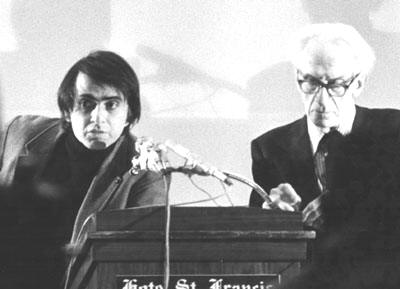I’ve put up posts before about Immanuel Velikovsky, the Russian-born psychiatrist turned catastrophist crank who presented a radical alternative to accepted planetary history. He was friends with Albert Einstein and Freeman Dyson, and was always perturbed that they and others in the scientific community didn’t take his science fiction “Worlds in Collision” theory seriously. From “Visionary to the Fringe,” by Paula Findlen in the Nation:
Early in the project, Velikovsky’s research took an unexpected turn. Seeking to confirm the historical reality of Exodus, he read the modern translation of the Ipuwer Papyrus and began to consider the potential correlation between ancient Egyptian catastrophes and biblical plagues: What had caused them, and were they indicative of a common pattern across cultures? After consulting Columbia anthropologist Franz Boas, he explored the records of ancient Mesoamerican civilizations. Velikovsky’s quest led him from the textual and archaeological challenges of deep history to the empirical findings and theoretical underpinnings of astrophysics, geology and paleontology. There, too, he found his greatest inspiration in historical sources, namely the scientific literature of the late seventeenth through early twentieth centuries, which lay neglected and largely forgotten in the stacks of the Columbia University library. Science’s past inspired his new vision of the present.
Velikovsky later observed that he rarely met professors in the library, lamenting the narrowly defined limits of their erudition in comparison with the breadth of his own. He read musty tomes that experts considered hopelessly out of date, attempting to absorb something from every possible domain of knowledge. In defense of his methodology, Velikovsky declared himself a historian and not a scientist, while nevertheless proclaiming the revolutionary importance of his findings for science. Historical data became his tool for rethinking science, though since Velikovsky failed to meet the empirical standards of either subject or to demonstrate his competence in basic research skills to expert satisfaction, neither discipline embraced him. However, scholarly disapproval has never been a serious impediment to public acclaim (consider the case of Trofim Lysenko or Malcolm Gladwell). Indeed, it became the cornerstone of his reputation as an anti-establishment figure, a latter-day Giordano Bruno or Galileo willing to be condemned as an intellectual heretic for defying authorities in pursuit of truth.•
_______________________
Velikovsky appearing on a 1964 episode of Camera Three:
Tags: Immanuel Velikovsky, Paula Findlen

